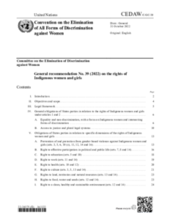The Committee highlights, in particular, the gravity of discrimination and gender-based violence against Indigenous women and girls with disabilities who are living in institutions.
From para 9:
Gender-based violence, including psychological, physical, sexual, economic, spiritual, political and environmental violence, is adversely affecting the lives of many Indigenous women and girls. Indigenous women often suffer violence in the home, in the workplace and in public and educational institutions; while receiving health services and navigating child welfare systems; as leaders in political and community life; as human rights defenders; when deprived of liberty; and when confined to institutions. Indigenous women and girls are disproportionately at risk of rape and sexual harassment; gender-based killings and femicide; disappearances and kidnapping; trafficking in persons; contemporary forms of slavery; exploitation, including exploitation of prostitution of women; sexual servitude; forced labour; coerced pregnancies; State policies mandating forced contraception and intrauterine devices; and domestic work that is not decent, safe or adequately remunerated. The Committee highlights, in particular, the gravity of discrimination and gender-based violence against Indigenous women and girls with disabilities who are living in institutions.
From para 12:
The Committee acknowledges that Indigenous women and girls have struggled and continue to struggle against forced assimilation policies and other large -scale human rights violations, which may in certain instances amount to genocide. 10 Some of these assimilation policies – in particular the forced placement in residential schools and institutions and the displacement of Indigenous Peoples from their territories in the name of development – have resulted in killings, disappearances, sexual violence and psychological abuse, and may amount to cultural genocide.11 It is critical for States parties to address the consequences of historic injustices and to provide support and reparations to the affected communities as part of the process of ensuring justice, reconciliation and the building of societies free from discrimination and gender-based violence against Indigenous women and girls. The Committee highlights, in particular, the need for States to act proactively to protect the rights of Indigenous women and girls living in urban settings, where they face racism, discrimination, assimilation policies and gender-based violence.

